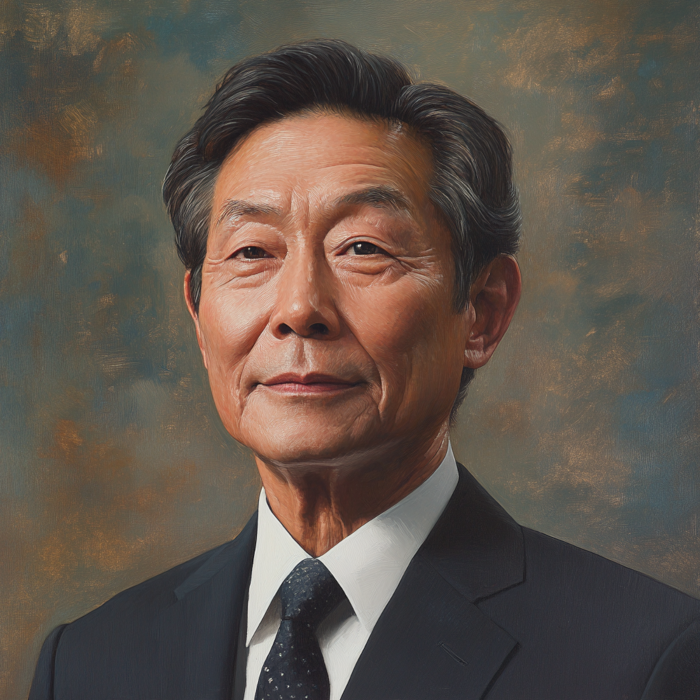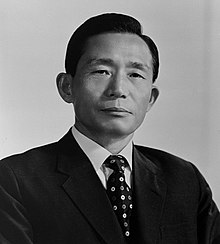


Park Chung-hee (1917–1979) was a South Korean military general and politician who served as the President of South Korea from 1963 until his assassination in 1979. Park is remembered for his role in transforming South Korea from a war-torn, impoverished country into one of Asia's most rapidly industrializing nations. However, his legacy remains deeply controversial due to his authoritarian rule, human rights abuses, and the suppression of political dissent. Park's leadership was marked by rapid economic growth driven by state-led industrialization but also by increasing political repression.
Birth and Family Background: Park Chung-hee was born on November 14, 1917, in Gumi, North Gyeongsang Province, during the period of Japanese colonial rule over Korea (1910–1945). He came from a poor family, the youngest of seven children. His early life was shaped by poverty and the hardships of colonial rule, which would later influence his desire to build a strong, economically independent South Korea.
Education and Japanese Influence: Park attended a Japanese-run teacher’s school in Daegu and worked as a teacher before entering the military academy. He went to the Manchukuo Imperial Army Academy and then the Japanese Military Academy, where he was trained as an officer in the Imperial Japanese Army. This military education under Japanese rule, combined with exposure to Japanese nationalism, discipline, and industrialization, shaped his views on governance and economic development.
Korean Army Career: After Korea’s liberation from Japan at the end of World War II in 1945, Park joined the newly formed South Korean Army. He quickly rose through the ranks, establishing himself as a capable and disciplined officer. During the Korean War (1950–1953), he played a significant role in defending South Korea from the communist forces of North Korea, gaining recognition for his military leadership.
1961 Military Coup: South Korea in the late 1950s and early 1960s was plagued by political instability, economic stagnation, and corruption under President Syngman Rhee. Rhee was forced to resign in 1960 following mass protests against electoral fraud and authoritarianism, leading to the short-lived Second Republic. However, the new government under Chang Myon struggled with inefficiency and instability. Seizing this opportunity, Park led a military coup on May 16, 1961, overthrowing the civilian government and establishing a military junta known as the Supreme Council for National Reconstruction.
Park justified the coup as necessary to restore stability, combat corruption, and promote economic development. While the coup was initially met with some skepticism, Park’s promise of economic reform gained him support among key segments of South Korean society.
Consolidation of Power: After two years of military rule, Park resigned from his position in the army and ran for president in the 1963 election under the newly formed Democratic Republican Party (DRP). He narrowly won the election and became South Korea’s president, marking the beginning of his long tenure in office.
Rapid Industrialization and Economic Growth: Park Chung-hee’s presidency is most often remembered for the rapid industrialization and economic growth that took place under his rule, which came to be known as the "Miracle on the Han River." Park implemented a series of ambitious Five-Year Economic Plans that focused on state-led industrialization, export-oriented growth, and the development of key industries such as steel, petrochemicals, electronics, and shipbuilding.
The government played a central role in directing economic development, often through close cooperation with large business conglomerates known as chaebols, such as Samsung, Hyundai, and LG. Park’s administration provided these conglomerates with access to capital, resources, and favorable policies, encouraging them to expand aggressively and compete on the global stage.
Infrastructure Development and Modernization: Park also invested heavily in infrastructure development, including building highways, power plants, and industrial complexes. His administration developed the Pohang Iron and Steel Company (POSCO), which became one of the largest steel producers in the world. These projects laid the foundation for South Korea’s transformation into a major industrial and economic power.
Export-Led Growth: Under Park’s leadership, South Korea shifted its economic focus from import substitution to export-led growth. The government promoted exports through subsidies, tax incentives, and favorable exchange rates, resulting in a dramatic increase in South Korean exports. By the 1970s, South Korea had become one of the fastest-growing economies in the world, a model for other developing countries seeking to industrialize.
Social Impact: While Park’s economic policies lifted millions of South Koreans out of poverty, they also came with significant social costs. Workers faced harsh conditions, long hours, and low wages. The government suppressed labor unions and strikes, viewing them as threats to economic progress. However, many South Koreans accepted these hardships as part of the nation’s effort to rebuild and modernize after the Korean War.
Suppression of Dissent: Despite his economic successes, Park’s presidency was characterized by increasing authoritarianism and the suppression of political opposition. The National Intelligence Service (formerly the KCIA) played a key role in monitoring and suppressing dissent, often arresting and imprisoning political activists, intellectuals, and journalists who criticized the regime.
Political opposition parties were regularly harassed, and elections were often marred by accusations of fraud. Park justified his authoritarian policies as necessary to maintain stability and continue South Korea’s rapid development.
Yushin Constitution (1972): In 1972, Park implemented the Yushin Constitution, which effectively turned South Korea into a dictatorship. The new constitution allowed Park to extend his presidency indefinitely and granted him sweeping powers, including the authority to dissolve the National Assembly, appoint one-third of its members, and enact emergency decrees without parliamentary approval. This marked the beginning of the Fourth Republic and cemented Park’s authoritarian control over the country.
Human Rights Abuses: Park’s regime was notorious for its human rights abuses, including censorship, the detention of political dissidents, and the use of torture. The most notable case was the imprisonment of Kim Dae-jung, a prominent opposition leader and future president of South Korea. Kim was sentenced to death for allegedly inciting the Gwangju Uprising in 1980 (though the uprising occurred after Park’s death), but international pressure led to his release and eventual exile.
Relations with the United States: Throughout his presidency, Park maintained a close relationship with the United States, which provided military and economic support to South Korea during the Cold War. Park’s government was a key ally of the U.S. in the fight against communism in Asia. South Korean troops were sent to support U.S. forces during the Vietnam War, further solidifying the U.S.-South Korean alliance.
North Korea and the DMZ: Park’s government faced ongoing threats from North Korea, led by Kim Il-sung. Tensions between the two Koreas were high throughout the 1960s and 1970s, with numerous skirmishes along the Demilitarized Zone (DMZ). In 1968, North Korean commandos attempted to assassinate Park in the Blue House Raid, but the plot was foiled.
Despite the hostility, Park did make an effort to improve inter-Korean relations in the early 1970s, leading to the July 4th South-North Joint Communiqué in 1972, in which both Koreas agreed to work toward peaceful reunification. However, these talks ultimately failed to produce lasting results, and tensions between the two countries remained high.
Assassination (1979): Park Chung-hee’s presidency came to a dramatic end on October 26, 1979, when he was assassinated by Kim Jae-gyu, the director of the Korean Central Intelligence Agency (KCIA) and one of his closest aides. The assassination occurred during a private dinner, and the motivations behind Kim’s actions remain unclear. Some believe Kim acted out of frustration with Park’s authoritarian rule and the increasing political repression, while others suggest personal grievances or conflicts within the regime. Park’s death left a power vacuum that was quickly filled by another military coup, led by Chun Doo-hwan.
Legacy of Economic Growth: Park’s legacy is highly complex and remains a subject of intense debate in South Korea. On the one hand, he is credited with laying the foundation for South Korea’s transformation into a global economic power. His policies of industrialization, modernization, and export-driven growth are widely seen as the driving forces behind South Korea’s "economic miracle." South Korea’s rise from one of the poorest countries in the world to an advanced, high-income economy is often attributed to Park’s vision and leadership.
Controversial Political Legacy: On the other hand, Park’s authoritarian rule and disregard for democratic principles have left a dark stain on his legacy. His suppression of political freedoms, human rights abuses, and the establishment of a dictatorial regime through the Yushin Constitution are viewed as serious violations of democratic values. His heavy-handed approach to governance created deep political divisions that would take years to heal.
Influence on South Korean Politics: Park Chung-hee’s influence on South Korean politics has persisted long after his death. His daughter, Park Geun-hye, followed in his footsteps and became South Korea’s first female president in 2013. However, her presidency was marked by scandal, and she was impeached and removed from office in 2017 amid mass protests over corruption and abuse of power.
Park Chung-hee remains one of the most consequential and polarizing figures in South Korean history. His role in transforming South Korea into an economic powerhouse is undeniable, but his legacy is tainted by his authoritarian rule, human rights violations, and suppression of political opposition. The economic successes of his presidency stand in stark contrast to the political repression that characterized his time in power, making his legacy a subject of ongoing debate. Today, Park is remembered both as a visionary leader who modernized South Korea and as an authoritarian ruler whose methods came at the cost of democratic freedoms.

We use cookies
We use cookies and other tracking technologies to improve your browsing experience on our website, to show you personalized content and targeted ads, to analyze our website traffic, and to understand where our visitors are coming from. Privacy Policy.